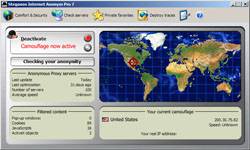- Qualcomm Launches Snapdragon 4 Gen 2 Mobile Platform
- AMD Launches Ryzen PRO 7000 Series Mobile & Desktop Platform
- Intel Launches Sleek Single-Slot Arc Pro A60 Workstation Graphics Card
- NVIDIA Announces Latest Ada Lovelace Additions: GeForce RTX 4060 Ti & RTX 4060
- Maxon Redshift With AMD Radeon GPU Rendering Support Now Available
Internet Anonymity – How you can stay safe online

Have you ever felt the need to remain anonymous, while surfing on the internet? Even if you are doing nothing wrong, it may be something to consider. In the article, we give great starter tips on how you can get on the road to anonymity.
Page 1 – Introduction
Years ago, if someone mentioned anything about remaining anonymous on the internet, it was usually associated with internet crimes. People who didn’t want to be caught, disguised themselves so that after a crime was committed, they could not be traced. Due to recent world events though, we are now being monitored more now, than ever. For some people, it may not matter since they know they are doing nothing wrong. To others, including myself, I’d rather perform my daily activities knowing that I’m not constantly being monitored.
It’s obvious though, that now even completely innocent internet users want to remain anonymous.. for the simple sake of privacy. What are some primary scenarios that could be different if you are anonymous? Better yet, why is it that everyday people want to remain anonymous? Here is what they makers of Anonymizer have to say:
The FTC estimated that close to 10 million people in the US were victims of identity theft last year. Protect your personal information, credit card numbers and financial transactions from online snoops with Anonymous Surfing.
Phishing and pharming attempts are becoming more and more popular. Sadly, the people who primarily fall for these tricks are normal users who are nowhere near being tech-heads, so they don’t pay attention to these risks as we would. It’s our responsibility, in my opinion, to make sure that our families and friends know what they are doing online, and they should have the knowledge of what to avoid. Since Phishing attacks can look *so* real, it’s no wonder so many people fall for them.
For others though, Phishing attacks are no threat, because some they know better. Online advertising is another reason that some people like to remain anonymous. I am sure many have experienced times when you visit a website and see a “Find love in (YOUR HOMETOWN), Click here!”. It’s obvious that they can track you down just using your IP address. Not that this usually does any harm, it still can leave an uncomfortable feeling.
The simple fact is, that no matter where you go on the internet, you can be watched. Just like how many people consider security cameras to be privacy threats, the same applies online, in a very similar manner. Whereas a camera can watch your every move, and they *are* everywhere, server logs are able to tell people where you came from, what you did on a website and even at what time.
Lastly, but of course not least, online banking and other secure services can be another huge reason for people to want to remain anonymous. Especially on public networks, information can be grabbed during transmission, then be decrypted. Because of this, people could potentially acquire your usernames and passwords without too much trouble. The same would apply for online Instant Messenging conversations.
Security and being safe on the internet is a huge deal to us at Techgage, so you will see more of these types of articles in the future. In this specific article, we will be primarily looking at the simple things you can do to help remain anonymous, so that you can have a true piece of mind while online.
One great all around solution to internet anonymity, are Proxies. Proxies protect you, because they essentially provide a layer of protection between you and the server for which you need information. It’s like a meat sandwich.. both slices of bread do not touch because of the meat in the middle. Proxies are not as complicated to understand as one may figure. It’s a rather simple matter of requesting information for view on your computer, and the Proxy server downloading the information instead. In turn, the Proxy then forwards the requested data to you. Because of this, the originating website that you requested information from, will see the Proxy server IP, not yours.
Of course, this is still not completely fool proof, since your IP address would likely be logged on the Proxy server. The only real reason you would have to worry at this point, was if you plan on activities that could cause some trouble. Authorities may not have too much trouble getting your IP address from the server admins, depending on laws in the Country where the server resides. For the everyday user though, it’s a fantastic level of protection.
Support our efforts! With ad revenue at an all-time low for written websites, we're relying more than ever on reader support to help us continue putting so much effort into this type of content. You can support us by becoming a Patron, or by using our Amazon shopping affiliate links listed through our articles. Thanks for your support!







